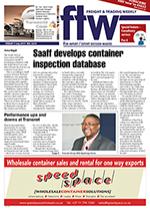The South African Association of Freight Forwarders (Saaff) is developing a database with the North West University that will provide statistics on container inspections. This is according to Saaff customs director, Richard Mallabone, who made the announcement at a Freight Forwarding and Logistics Roundtable hosted by FNB in Johannesburg last week. Mallabone explained that the country had never had reliable container inspection statistics that could be presented to government. “We’ve never been able to say to them: You’ve stopped 5% of shipments coming into the country and of those, Saaff develops container inspection database 90% are getting released as entered, for example.” He added that Saaff was looking to roll out the database to all government departments to show them where obstacles existed. “Unless we curtail and manage our risk from a government perspective we’re going to stop trade coming in and through South Africa, because of these obstacles.” Mallabone said border management companies in South Africa currently managed the stopping of containers with manual manifests, with all shipping lines having to physically provide manifest documents to the police in Durban and Johannesburg. He explained that while Sars used a technology database, it wouldn’t share it with the South African Police Service (SAPS). “SAPS either stops containers based on the description in the container or entirely at random. The risk engine is horribly broken because that is not managing risk,” he said. Mallabone believes the problem begins with the Sars technology database, because all other government departments are not linked into it. “That is an obstacle to trade, whether into South Africa, through South Africa or over its borders.” He said one only had to look at delays at the country’s border posts and the fraud in the round-tripping of cargo to see the consequences of this. “We are unable, through various government departments, to link all the technology together and work as one entity that improves the flow of cargo through South Africa and into sub-Saharan Africa.” He said the SAPS was stopping shipments on behalf of the National Regulator of Compulsory Specifications (NRCS), which wanted to ensure goods complied with relevant regulations and/or that importers had the appropriate Letter of Authority. Mallabone relayed how a large tyre importer with 30 containers on rail to Gauteng had been stopped by Durban SAPS, and 20 of the containers returned to Durban for examination. “We should be doing post audits of that type of product. We shouldn’t be physically stopping the cargoes of well-known, registered importers and respected customers of Sars,” he said.

